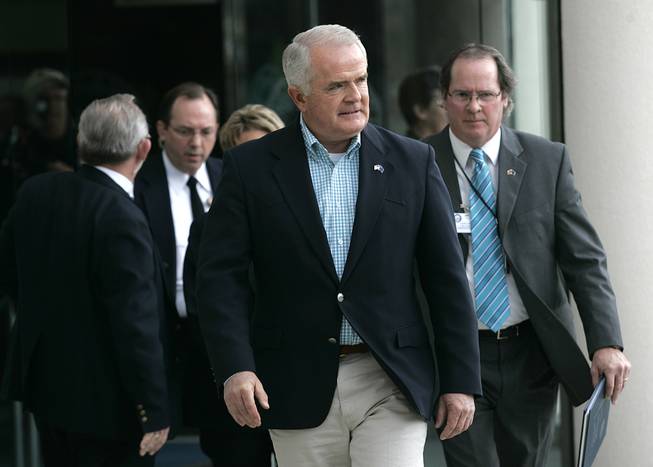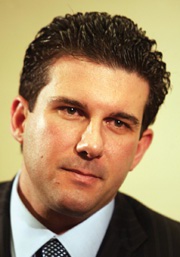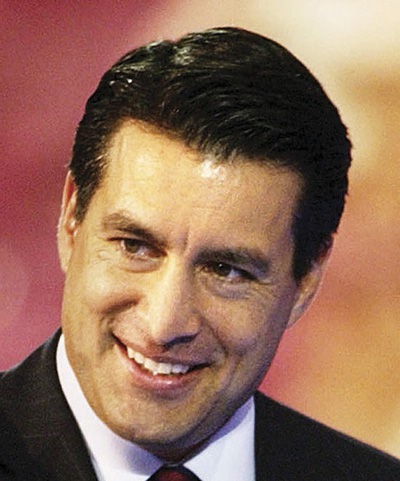
Gov. Jim Gibbons leaves the Legislative Building after meeting with Assembly and Senate leaders behind closed doors on Day Four of the special session Feb. 26 in Carson City.
Published Friday, March 12, 2010 | 11:58 a.m.
Updated Friday, March 12, 2010 | 3:46 p.m.
Related Document (.pdf)
Sun Coverage
An appropriations bill signed into law by Gov. Jim Gibbons was challenged in two lawsuits over the state's taking of $62 million from the Clean Water Coalition in Clark County to help balance the state budget.
An M Resort lawsuit for injunctive and declaratory relief as well as for damages was filed this morning in Clark County District Court. Named as defendants were the Legislature, Gov. Jim Gibbons, state Treasurer Kate Marshall, state Controller Kim Wallin and the Clean Water Coalition.
The lawsuit states that the Henderson resort paid more than $1.5 million in sewer connection fees to the Clean Water Coalition last year between May and September.
The lawsuit from the Clean Water Coalition, also filed in Clark County District Court, named the state of Nevada and state Treasurer Kate Marshall as defendants.
The coalition, which includes the Clark County Water Reclamation District and the cities of Las Vegas, Henderson and North Las Vegas, argued that the taking of the $62 million "constitutes an improper and unconstitutional imposition of a tax" imposed on residents of the coalition's member agencies.
The coalition's general manager, former Clark County Commissioner Chip Maxfield, said the money was intended for the Systems Conveyance and Operations Program, a proposed pipeline project that would transport treated wastewater to the Colorado River. Though the project has been suspended, Maxfield still indicated that what the state did was wrong.
"The position of the CWC and its board is that the money, which was collected from Southern Nevada residents and businesses specifically for the SCOP project and water quality purposes, should remain in Southern Nevada to fund water quality projects," Maxfield said.
The coalition board's chairman, Clark County Commissioner Larry Brown, also expressed disappointment in the state.
"We made commitments to businesses and citizens that the money collected would be dedicated to protecting our water quality," Brown said. "The state's action breaks that promise to our community. We believe the state's action is illegal, unconstitutional and sets a terrible precedent for the future."
The crux of the M Resort lawsuit is the argument that the $62 million of coalition money taken by lawmakers during last month's special session to shore up the state's budget was intended only for clean water projects to benefit users who fund the coalition. The lawsuit demands that the money be returned to those who paid into the fund if it will not be used by the coalition.
"The confiscation of the Clean Water Coalition's funds is an unconstitutional taking of private property, an unconstitutional impairment of contractual obligations, violates the Equal Protection Clause of the United States Constitution and Nevada's constitutional mandate of uniform and equal taxation and assessment, and contravenes fundamental principles of law and equity," the lawsuit states. "A tax is a tax. And a fee is a fee. A tax is a generalized assessment which funds generalized functions beneficial to all while fees are specific assessments designed to pay for specific functions benefiting those who pay the fee. The legislation at issue discards the distinction and converts fees paid by a subset of Nevadans into a de facto tax."
M Resort President and CEO Anthony Marnell III told the Sun in a phone interview that filing the lawsuit was not an easy decision.
"I love this state," he said. "I was born here. This is not an easy thing to do but this is about right and wrong and this is wrong.
"I don't believe it's lawful and it's not the way to do business in the state," he said of the decision by lawmakers to use the coalition money. "It's not the right way to run the state or shore up the shortfall."
If the money isn't being used for water projects, Marnell said, "it should be refunded to the people who paid into it."
The resort's attorney, Christopher Kaempfer of Las Vegas, said several other undisclosed businesses have contacted him about possibly joining the lawsuit but have not yet done so.
The coalition, which includes local government representatives, decided Thursday that it, too, would sue the state but it has not yet filed with the court. Kaempfer said the only reason the coalition was named as a defendant in the resort's lawsuit is that the coalition holds the money in question.
Kaempfer said that if the coalition does sue, though, that it is likely the court will consolidate the lawsuits.
Until a judge issues a ruling, the state could take the $62 million in question, Kaempfer said. But he added: "I think the state would be ill-advised to use these funds while the legal challenge is out there."
State Senate Majority Leader Steven Horsford, D-North Las Vegas, said today he was disappointed in the lawsuits but it doesn't change his view that the Legislature justifiably used the coalition's funds.
"We believe the Legislature has the full authority to do what it has done, which is to balance the budget," Horsford said. "The funds collected are not going to be used as intended and there were no voter approvals or bond restrictions. We felt it was important to redistribute the funds.
"While water and sewer are important, so is funding for schools, the health system and public safety."
Horsford said that members of the Legislative Counsel Bureau, which provides legal advice to legislators, had met with members of the coalition prior to the Legislature's special session to warn them about the possibility that the coalition's money would be used to help fill the budget gap.
Assembly Speaker Barbara Buckley, D-Las Vegas, also expressed disappointment in the lawsuits, saying they are very "shortsighted."
"Our goals were to minimize the devastating cuts to education and senior services," Buckley said. "I get a sense that people don't know how desperate a time it is for our state's finances. It's way beyond dire."
Buckley said her impression is that the coalition had no intention of ever returning the money to the businesses and individuals who paid into its fund.
"Our lawyers indicated we could use these funds so we did," Buckley said. "If we're making a decision between laying off a thousand teachers or minimizing that, we're going to minimize that impact."
Lawmakers have said that if forced to return the money to the coalition that there would be an additional 3.5 percent cut to kindergarten through 12th grade, as well as higher education, in addition to the 6.9 percent reduction approved during the special session.
The Clean Water Coalition decided Thursday to sue the state to keep the money, arguing that state legislators had no constitutional right to take $62 million collected to build a pipeline into Lake Mead.
The coalition’s board voted 3-1 to file a lawsuit, with only Las Vegas City Councilman Steve Ross voting against it.
The coalition was created in the early 2000s to oversee construction of an $880 million pipeline that would funnel treated wastewater deep into Lake Mead. The idea was that it would better dilute the water than letting it drain into the shallow Las Vegas Bay, an inlet of Lake Mead.
Legislators have said they felt free to take the money because the coalition board voted to mothball the project in December, after member agencies argued the pipeline was no longer needed because wastewater treatment technology had improved so drastically.
Governor says special session unlikely
Gibbons said Friday he would be reluctant to call the Legislature back into special session if the state lost the lawsuit over the $62 million siphoned by the state from the coalition.
Gibbons signed a state budget bill that cuts spending and raises taxes and fees by $53 million during the two fiscal years to fill the near $900 million hole.
Gibbons told a news conference that leaders in the Legislature proposed taking the money from the coalition and that Legislative Counsel Brenda Erdoes said it was legal.
He said nobody on his staff had checked the legality of the plan.
If the state loses the suit, it would leave a $63 million hole in the budget. Gibbons said he would try to make adjustments by executive order rather than reconvening the Legislature in special session to take care that shortfall.
The budget bill will cut state aid to the public schools by $116.8 million, not the $211 million proposed by Gibbons. It will reduce spending to the university system by $46 million instead of the recommended $76 million.
And there will be reductions in other agencies.
Asked about the increase on the tax on mining, Gibbons said the industry agreed on it and it does not hit small miners. He did not call it a tax, but instead said it was a fee.
“It is beneficial to the state of Nevada not subsidizing an industry that has agreed to pay for those subsidiaries,” he said.
Brian Sandoval, who is challenging Gibbons in the GOP primary election, said Gibbons did raise taxes. He pointed to fee increases on mining and banking and hikes in business filing fees and state park admissions.
Sandoval said, “I wouldn’t have supported any fee or tax increases.”
Gibbons told the news conference that Sandoval “does not understand the application of the user paying the cost of state government which is a recommendation out of the SAGE commission.”
The budget bill does not increase the tax on miners with fewer than 11 claims. But those holding 11-199 claims will pay an extra $70 for each. For those with 200 to 1,299 claims, the added fee will be $85 each. And for those miners with more than 1,300 claims, the tab will be $195 each. The tax will expire on June 30, 2011, unless renewed by the Legislature.
The bill will impose higher fees for filing documents with the Secretary of State’s Office. Banks and others that file foreclosure documents will be charged an extra $150.
Boxing and wrestling promoters will be able to raise the admission tax from 4 percent to 6 percent. The state Gaming Control Board will boost its fee from $80 an hour to $135 an hour for investigating background of new applicants.
Parks and museums are setting in motion the machinery to increase their entrance fees.
There would be a fee assessed to prison inmates who buy electronic devices such as cell phones. And lobbyists registering for the 2011 session would be hit with increased fees.



Join the Discussion:
Check this out for a full explanation of our conversion to the LiveFyre commenting system and instructions on how to sign up for an account.
Full comments policy